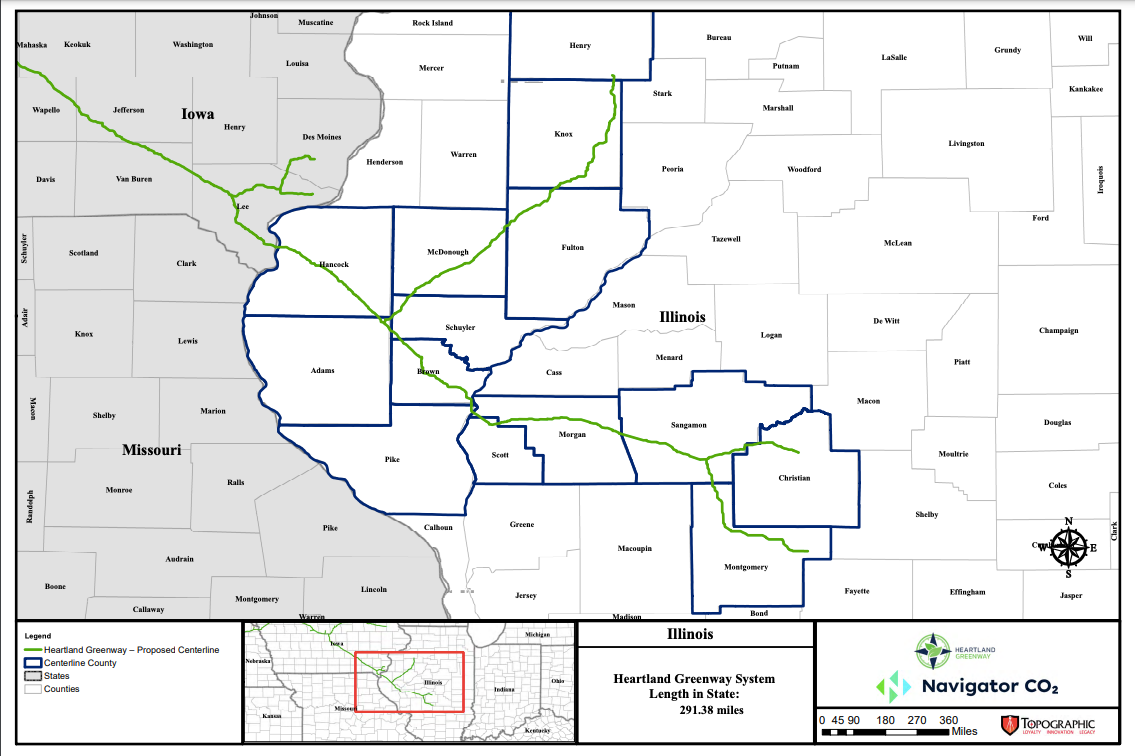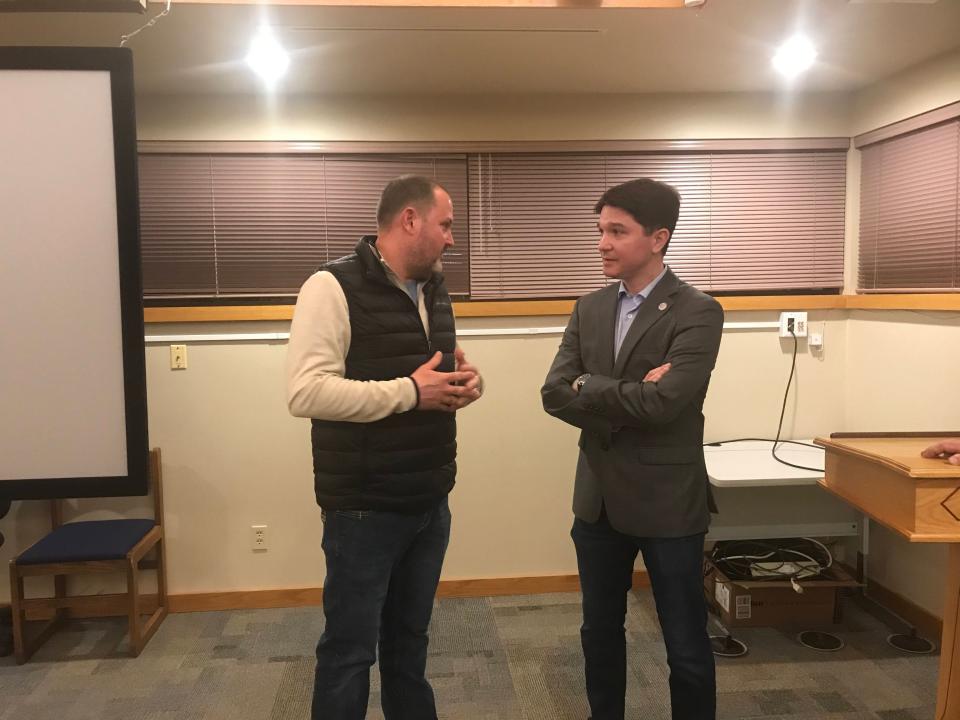What to know about Navigator's new, expanded C02 pipeline application

After withdrawing its initial application in January, Navigator CO2 Ventures has filed a new route for its Heartland Greenway carbon dioxide pipeline with the Illinois Commerce Commission.
The new application includes more miles primarily because of the addition of a route lateral to the original that stretches to Montgomery County. The application also has updated figures on economic benefits to the region. Illinois is one of five Midwestern states included in the 1,350-mile plus, $3.4 billion pipeline which seeks to remove carbon emissions from the atmosphere and store it underground.
Recent:Navigator withdraws CO2 pipeline proposal; set to file new one with an expanded route
Elizabeth Burns-Thompson, Navigator vice president of government and public affairs, said the project now impacts about 900 landowners in Illinois. The Nebraska-based company refiled the application, she said, to streamline the approval process instead of updating its original application submitted in July.
Burns-Thompson said the geology of the region makes it prime land for reducing emissions entering the atmosphere. Already close to 1 million metric tons of CO2 were captured during a three-year study conducted by the Illinois State Geological Survey at the Archer Daniels Midland ethanol production facility in Decatur.
The carbon dioxide was injected into the Mount Simon Sandstone formation - the same formation where Navigator will place its sequestration sites. Overall, Navigator projects its pipeline will be able to collect, transport, and store up to 15 million metric tons of carbon dioxide annually when it is fully implemented.
"We say central Illinois because it really isn't restricted to one particular county or another," she said, referring to the area's ability to store carbon dioxide. "The geology is not only right for this type of activity- sequestration, geological sequestration - but it's been proven to be able to do that over the years."
The expanded scope and claims of economic boom continue to raise questions from the Coalition to Stop CO2 Pipelines, an advocacy group with members living in the Illinois counties where the pipeline is planned.
At a legislative town hall Monday in Taylorville hosted by state Sen. Steve McClure, R-Springfield and state Rep. Brad Halbrook, R-Shelbyville, opponents said their safety concerns were still not addressed in the refiled proposal.
Leery residents cite fears of a pipeline leak similar to one in Satartia, Mississippi that resulted in 45 people being hospitalized three years ago. The pipeline's proximity to Taylorville's more populous areas could be even more devastating if a leak were to occur said resident Dean McWard.
"We have three schools and a hospital on the north end of town," McWard said, a local farmer. "It's the worst place in the county to put it."
Updated route, facilities
Navigator's original pipeline proposal stretched about 250 miles through 13 counties - Adams, Brown, Christian, Fulton, Hancock, Henry, Knox, McDonough, Morgan, Pike, Sangamon, Schuyler and Scott - in central and western Illinois.
The new proposal includes more than 291 miles of pipeline and adds Montgomery County to the mix through what is called the "Montgomery Lateral." The lateral pipeline diverts from the main line in southern Sangamon County and travels 42 miles to a new proposed sequestration site in Montgomery County.
The Montgomery sequestration site, where the liquified carbon dioxide will be stored, would join another proposed in Christian County. The Christian County Board already has placed two moratoriums against issuing special use permits for the underground facilities, including the most recent adopted in October.
This new site concerns Joe Gleespen who lives less than five miles from the proposed Montgomery sequestration site.
"This is not going to be a benefit to any of the local area," he said. "It's going to be a dumping ground for the upper Midwest."
Related:A 1,300-mile CO2 pipeline could run through Sangamon County. Here's why it faces a fight
A new above-ground launcher site in Sangamon County is also included in the new plan. It will act as a location for internal inspection tools, said Burns-Thompson. The autonomous equipment will perform an examination, "effectively x-raying" the pipeline's wall thickness and for signs of pipeline corrosion.
The launcher site will be about two acres and will be fenced off to "ensure safe and reliable operation of the pipeline," according to the proposal.
Legislative action

Opponents have been active in attempts to build local and state-level political support since the pipeline plans became public.
So far, county boards in Christian, Fulton, McDonough and Sangamon have issued moratoriums against any pipeline to be built in their areas. Sangamon was also the first county to intervene in Navigator's ICC filing back in August 2022.
Following suit with counties in his 54th Senate District, McClure introduced Senate Bill 1916 which also calls for a two-year maximum moratorium. His bill, receiving bipartisan support, requests ICC to reject any CO2 pipeline until the federal Pipeline and Hazardous Materials Safety Administration updates its safety transport standards.
PHSMA announced in May that it would update the standards in addition to completing a failure report on the Satartia incident. McClure and Halbrook said a moratorium is needed while the administration is drafts new guidelines.
The senator's bill and other local municipalities that have issued moratoriums, Burns-Thompson said, are being "driven by misunderstanding.
I think many folks have a misconception that somehow if the pipeline is built that somehow we are grandfathered-in or exempt from any new safety regulations that may come down the road," she said, "and that's just not the case."
As reported by The Des Moines Register, Iowa Republicans proposed bills earlier that would place limits on the use of eminent domain by the three companies attempting to build pipelines in their state. Two bills recently introduced by Illinois Democrats call for similar action.

Senate Bill 2421 from state Sen. Laura Fine, D-Glenview, co-listed under House Bill 3119 from state Rep. Ann Williams, D-Chicago, would create the Carbon Dioxide Transport and Storage Protections Act to address several updates to pipeline construction and management.
Specifically, the bill eliminates a company's ability to secure private land in the pore space - a small subsurface area that allows for the storage of carbon dioxide - at sequestration sites without the proper approval. Operators would have to receive a written grant from the landowner or a title permitting the use of the land.
Illinois law is unclear about what protections a landowner has in these instances. The impact of the land use, however, has the potential to harm crops, water supply and the ecosystem, according to the proposed legislation.
Burns-Thompson noted the change to eminent domain would only apply to sequestration sites and not at other points of the pipeline. Other states including Indiana already have bills on file regarding right-of-way use at pore spaces.
"It's not that uncommon in Midwestern states and you have neighboring areas that are looking at this as an opportunity to help facilitate growth in these projects," she said.
The act also notably establishes a "emergency responder fee" that operators would owe the state based on a rate set by the Illinois Emergency Management Agency. The fee would in turn fund training for first responders in case of a pipeline emergency.
Benefits versus costs
The new application has updated figures on expected economic benefits for the region related to employment, right-of-way payments, and sales tax revenues.
In total, Navigator estimates up to 3,500 jobs will be created directly and indirectly through the project once construction begins in the second quarter of 2024. The company argues in the ICC petition the jobs will lead to higher tax revenues for local communities.
Christian County Board Chairman Bryan Sharp doubts the reported boosts to local economies will be permanent.
"There's no real long-term jobs affiliated with it in this area," he said, noting that many of the jobs would be available only to specialized construction workers.
The project would not be subject to property taxes, but Burns-Thompson said the company will work with local governments in the Illinois zone to create "community benefit agreements." This is unlike Iowa, Minnesota, Nebraska and North Dakota - the other states included in the pipeline - where Navigator will pay property taxes.
She said opponents have painted the agreements as a way to "buy off" counties, which is not the company's true intention.
ROW payments — payments due to landowners affected by the pipeline construction — are also expected to grow to $38 million, up from $32 million in the July petition because of the expansion into Montgomery County, Burns-Thompson said.
ICC:Ameren Illinois cites clean energy act, COVID-19, war for electric, gas rate hike request
What's next?
The week following Navigator's filing already has brought several testimonies before ICC, who have all spoken in favor of the pipeline.
The ICC and its independent, five-member advisory team will review the application over the next 11 months and are expected to make a decision in late January 2024.
Contact Patrick Keck: 312-549-9340, pkeck@gannett.com, twitter.com/@pkeckreporter.com
This article originally appeared on State Journal-Register: Navigator CO2 Ventures adds miles, sequestration site to pipeline plan

